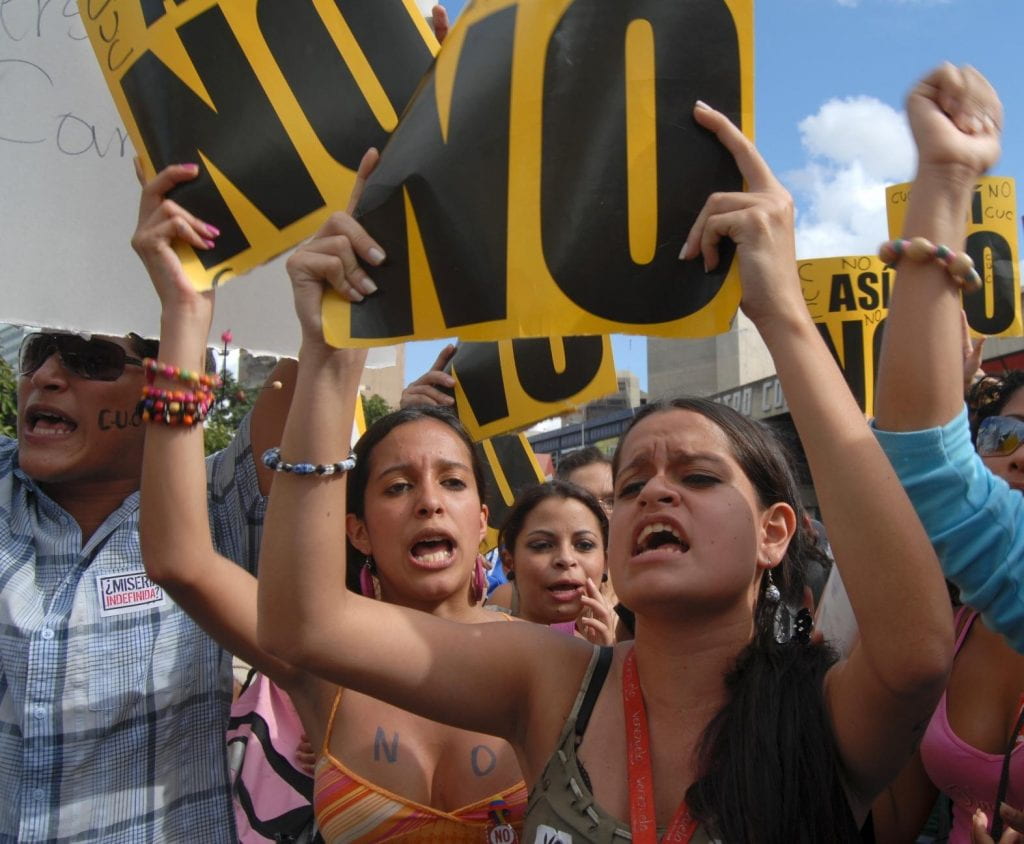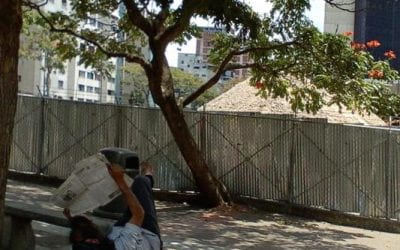Euro Cup and Revolution

Students hold up “No” signs in opposition to the referendum on constitutional reforms, which was eventually defeated. Photos by Lindsay Ross
We’ve heard it all before. A white privileged minority exploits a non-white population until a charismatic leftist leader from the oppressed majority—thriving on class and racial tensions—leads a revolution to force the elite to pay for its sins. Given Venezuela’s oil wealth, the country’s high inequality is one more expression of the elite’s selfishness.
This Robin Hood story, ubiquitous in much of the international press and forcefully popularized by the Venezuelan government, just does not fit the facts. After World War II, Venezuela became the first Latin American destination for economic migrants from Southern Europe, especially Italy, Spain and Portugal. Descendants of these economic migrants became an important segment of the Venezuelan middle class. For example, Dan Levy and Dean Yang in their “Competing for jobs or creating jobs? The impact of immigration on native-born unemployment in Venezuela 1980-2003” (Mimeo. Harvard: Center for International Development, 2006), estimate that during the 10 year period between 1948 and 1958, Venezuela—a country of about 7 million in those days—received more than half a million immigrants. These newcomers, with only seven years of education, raised the ratio of foreign born to the total population to 6.9% by 1960, well above that of the US at 5.4%, according to World Bank figures. Venezuela has also been the land of opportunity for Colombians (around one million Colombians live in Venezuela today), Ecuadorians, Dominicans, Guyanese, Haitians, Lebanese (like my grandfather), Arabs and Jews.
These facts beg the following question: Why would poor and uneducated immigrants go to a country where opportunities were only available for privileged and selfish elite?
Social tensions in modern Venezuela have traditionally been remarkably low by either Latin American or even U.S. standards. Venezuela enjoyed the highest growth in Latin America between 1922 and 1980. Especially after 1958, Venezuela’s democracy was able to radically improve social mobility. The country reduced its Gini inequality coefficient to 39 in the late 1970’s, the lowest in Latin-America, well below that of Uruguay and Costa Rica, two countries often mentioned as role models.
Racial tensions have been almost non-existent compared to other Latin American countries. As a consequence of the brutal Independence and Federalist wars of the XIX century, Venezuela’s relatively small pre-independence white population—only 22% of the population was white compared to 63% in Colombia—was decimated. “Free pardos” accounted for almost half (48%) of the Venezuelan population at that time while in Colombia, they hardly reached 10% of the population. (See Lievano Aguirre, Indalecio (2007). Bolivar. Editorial Grijalbo, 2007)
These tragic historical events reshaped the racial and class mix of the country giving pardos and mestizos access to high office early on and turning Venezuela into one of the most horizontal Latin American countries. For example, back in the 1940s there were deep differences between Venezuela and Cuba, another Caribbean country whose revolution Chávez is trying to emulate. Specifically, in 1949, while the Adecos—the social democrats— were in political exile, Luis Beltran Prieto Figueroa, a former Venezuelan Minister of Education was refused entrance to the Tropicana night club in Havana because he was “black.” This came as a huge shock to other Venezuelan exiles in Cuba —my father included—who had grown up in a society where the color of the skin was not an issue.
In other words, the story of racial and social tensions inherited from colonial times—which this government has been promoting to create a revolution based on class struggle— is deceiving. On the contrary, the relative diversity, openness and horizontality of the Venezuelan society have impressed visitors for decades and have attracted immigrants from different races, nationalities and religions.
Along those lines, let me share this personal story. Last June I was in Venezuela during the Euro Cup. As happens every four years, flat screens were set up in bakeries, liquor stores, cafeterias, bars and restaurants—many of them owned by southern European descendants—to watch the games on the other side of the Atlantic. Italy and Spain were playing the quarter-finals on Sunday, June 22. That morning I stopped to buy fresh bread at a bakery in my mostly Jewish neighborhood. To the surprise of an Israeli friend who had believed the official story of racial and social tensions in my country, the black man at the register, greeted me (a white woman) with a typical: “mi amor (my love) who are you rooting for today?” I told him with a smile that I was rooting for Spain. As he winked back in agreement, the owner of the bakery—an Italian descendant—came out shouting “forza Italia!” to which other customers responded “viva España”! Waving Spanish flags.
Like the father of the bakery’s owner, 31% of the European economic immigrants became small entrepreneurs in Venezuela. This rate, which is 10 times higher than that of Venezuelans with similar levels of education, reflects in part the fact that barriers to entry were low and that the Venezuelan-born enjoyed preferred employment policies in the private sector and increasing job opportunities in the public sector. In spite of this discrimination, these migrants prospered and have become the bulk of today’s white middle class.
Though these facts do not jive well with the Robin Hood story, what else could explain the popularity of a figure that has based his political platform precisely on this paradigm?
The truth is that Venezuela’s democracy between 1958 until the late 80s was able to massively improve education, health, housing and other social outcomes but based it on an economic strategy highly dependent on oil. When oil revenues started to falter—average oil exports per capita went from over US$2100 in the late 70’s to a little over US$700 in the late 90s— the system was unable to balance the books unless the government—owner of the oil rent—raised taxes or reduced social benefits. As it tried to do so, the two-party system of the Christian and Social Democrats that had governed Venezuela since 1958 lost its popular support. Blaming corruption, a nasty and real but limited problem, for what was actually a fall in real incomes, society opted for a person—Hugo Chavez—that promised a political clean slate. Unfortunately, the diagnosis was wrong and the remedy—a Marxist revolution—has made things worse. Political polarization, violence and corruption have grown to worrisome levels and though higher oil prices have allowed a much higher level of government spending, inequality has failed to decline and social indicators have made little progress, as shown by Francisco Rodriguez in “An Empty Revolution: The Unfulfilled Promises of Hugo Chavez.” (Foreign Affairs, 87(2), March/April, 2008)
The next Euro Cup will be in 2012, the year when next presidential elections are due. Let us hope that the happy story of my neighborhood continues to hold.
Ana Julia Jatar is Communications Director of the Carr Center for Human Rights Policy at Harvard’s Kennedy School of Government. She was a Visiting Scholar at the David Rockefeller Center for Latin America Studies from 2001-2003 and a Senior Fellow at the InterAmerican Dialogue in Washington from 1994- 2001 Host of CNN’s “Choque de Opiniones,” a weekly news show which debates issues of importance to the United States and Latin America, she is also a member of the editorial boards of Venezuela’s El Nacional and the Internet publication analiticapremium.com.
Related Articles
Editor’s Letter: Venezuela
Long, long ago before I ever saw the skyscrapers of Caracas, long before I ever fished for cachama in Barinas with Pedro and Aída, long before I ever dreamed of ReVista, let alone an issue on Venezuela, I heard a song.
Elections and Political Power: Challenges for the Opposition
English + Español
Next month’s elections will be an important benchmark in Venezuelan politics. On November 23, voters will go to the polls to elect 22 state governors and 355 mayors in as many municipalities, as well as choose the mayor of Caracas. The elections are taking place in a political environment influenced by the abrupt proclamation of 26 laws on July 31, the last day of President Chávez’s 18-month powers to issue emergency decrees …
A Review of Tramas del mercado: imaginación económica, cultura pública y literatura en el Chile de fines del siglo veinte
Luis Cárcamo-Huechante’s new book provides us with a convincing counter-narrative, at once nuanced and succinct, to three mainstream narratives of the neoliberal free market in Chile: those of monetarist economics, promotional politics, and literary bestsellers. It covers the Pinochet dictatorship (1973-90) and the transition to democracy from its official inauguration in 1988, with the victory of the Yes vote for a return in two years’…




